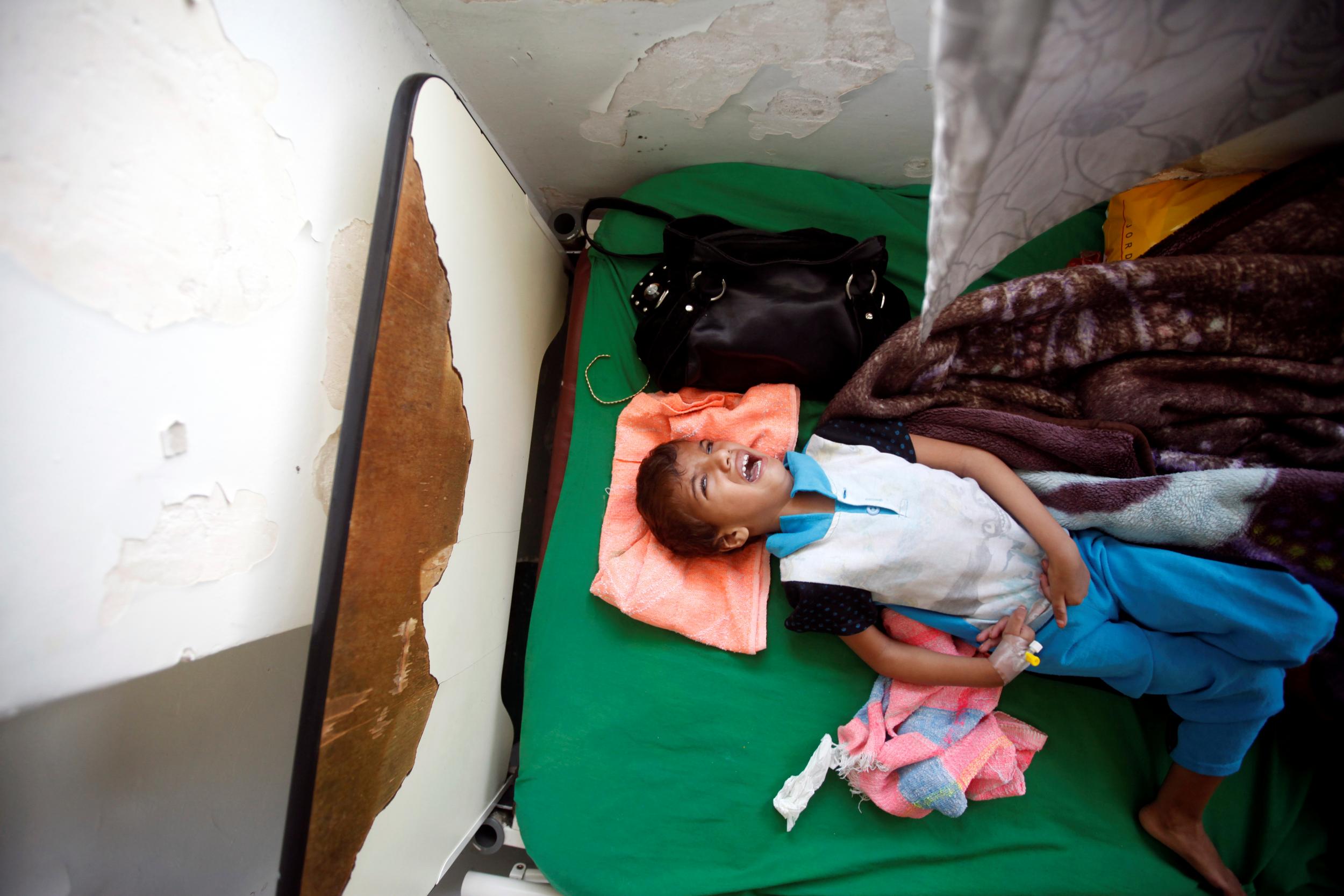More dying in Yemen from Saudi-led airport blockade than from air strikes, NGOs warn
Aid groups say lack of access for aid shipments is leading to thousands of deaths from treatable diseases

Your support helps us to tell the story
From reproductive rights to climate change to Big Tech, The Independent is on the ground when the story is developing. Whether it's investigating the financials of Elon Musk's pro-Trump PAC or producing our latest documentary, 'The A Word', which shines a light on the American women fighting for reproductive rights, we know how important it is to parse out the facts from the messaging.
At such a critical moment in US history, we need reporters on the ground. Your donation allows us to keep sending journalists to speak to both sides of the story.
The Independent is trusted by Americans across the entire political spectrum. And unlike many other quality news outlets, we choose not to lock Americans out of our reporting and analysis with paywalls. We believe quality journalism should be available to everyone, paid for by those who can afford it.
Your support makes all the difference.Saudi Arabia proposed on Thursday that the United Nations reopen and run the international airport in Yemen’s capital, which has been closed for a year because of a Saudi blockade to pressure the Houthi rebel movement.
The Saudi proposal, made by a spokesman for the military coalition that has been bombing the rebels in a war that began more than two years ago, appeared to take the United Nations by surprise.
It came a day after international aid groups, vexed at what they called obstacles created by the Saudis that are hindering efforts to send relief supplies to Yemen, said that more civilians had died from deprivations attributable to Saudi restrictions on Yemeni airspace than from military airstrikes.
“Denial of access to travel has condemned thousands of Yemenis with survivable illnesses to death,” Mutasim Hamdan, the Norwegian Refugee Council’s country director in Yemen, said in a statement. “Without access to safe commercial travel, Yemenis are left with no way to access critical medical care.”
The capital, Sanaa, is occupied by the Houthi rebels, who control much of the country’s north. But the airspace is controlled by Saudi Arabia, which regards the Houthis as proxies for its regional rival, Iran.
Sanaa International Airport was closed to commercial traffic on 9 August 2016, leaving thousands of Yemenis with no practical way to leave the country.
“The reopening of Sanaa airport is essential to alleviate the suffering of the civilian population,” Jamie McGoldrick, the UN humanitarian coordinator for Yemen, said in a Twitter post Wednesday, the first anniversary of the closing of the airport.
Any reopening would require an agreement between the antagonists in the war, which has led to what the United Nations has called the world’s worst humanitarian disaster.
Col. Turki al-Malki, spokesman for the Saudi-led Joint Forces Command military coalition, said in a statement that the coalition had been working to ensure the safety of air traffic in areas of the country not controlled by the Houthis.
The statement said the shutdown of Sanaa’s airport and other security restrictions on air traffic “should not be stigmatized as the cause of suffering for the Yemeni people.”
It asked the United Nations “to contribute in resuming flights from and to Sanaa airport through managing airport security and putting the legitimate Yemeni government fears to rest.”
The statement, in a report by the official Saudi Press Agency, was titled “Official Coalition Spokesman Asks UN to Run Sanaa International Airport.”
Stéphane Dujarric, a spokesman for the United Nations in New York, said, “We’re examining the report,” but he had no further comment.
The United Nations has experience in managing airports in countries where it has deployed peacekeeping contingents, but there is no such force in Yemen.
Joel R. Charny, director of the Norwegian Refugee Council’s Washington office, said he was skeptical of the Saudi proposal, asserting that similar arrangements had been made for aid shipments into the Houthi-controlled port of Al Hudaydah.
“We’re still seeing delays, where it’s the equivalent of a blockade,” he said. “In our view, it’s part of a strategy to squeeze the civilian population of Yemen as part of the war effort.”
Saudi Arabia has denied that it is intentionally targeting civilians in the war, which has shown no sign of ending.
An estimated 10,000 people have been killed, millions have been displaced, and much of the population is threatened by famine. A collapse in the health care system has exacerbated an outbreak of cholera that has sickened roughly 400,000 people.
In a further threat that took shape this week, Yemen’s national blood bank could face a shutdown because it has nearly exhausted supplies.
Doctors Without Borders, the medical charity, had been supporting the blood bank since September 2015 but transferred its responsibility to the World Health Organization in June.
Tarik Jasarevic, a spokesman for the WHO, said in an email that supplies had been ordered for the blood bank but that they had not yet reached the country.
Ayman al-Shihari, the director of the blood bank, was quoted by The Associated Press on Thursday as saying that the blood bank had received up to 3,000 patients monthly and that closing it could lead to a “humanitarian catastrophe.”
(C) New York Times
Join our commenting forum
Join thought-provoking conversations, follow other Independent readers and see their replies
Comments